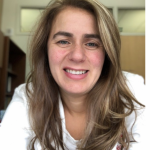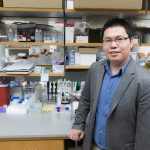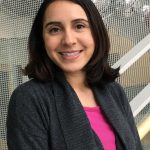Four UW faculty recognized with Early Career Innovator Awards
The Early Career Innovator Award, sponsored by the Office of the Vice Chancellor for Research and Graduate Education, helps kick off the 175th anniversary of the university this month by recognizing its early career faculty members for engaging in technology transfer and commercialization activities.
“Throughout its history, UW–Madison researchers have produced transformative discoveries within a culture that fosters bringing those discoveries to the market,” says Steve Ackerman, vice chancellor for research and graduate education. “Recognizing early career faculty for their contributions to the commercialization of technology out of UW-Madison is a great way to celebrate our historical achievements in entrepreneurship while also looking forward to the promise of future innovation to come from the efforts of faculty such as these awardees.”
The awardees were selected by OVCRGE from a list of finalists provided by the Wisconsin Alumni Research Foundation. Awardees receive $50K in funding. Each has had multiple disclosures and inventions accepted for commercialization.
“These awardees and their inventions present exciting solutions to known important problems,” Ackerman says. “These innovators are committed to the Wisconsin Idea by translating scientific findings into applications, products and services that can change the world.”
Early Career Innovators
Guelay Bilen-Rosas, associate professor of anesthesiology in the School of Medicine and Public Health, earned a top prize in the 2021 Equalize pitch competition hosted by Washington University in St. Louis and in doing so, encouraged other female faculty to pursue entrepreneurship. Bilen-Rosas’ research focuses on airway management and physiology.
“Breathing complications in healthcare arise because of our inability to measure ventilation directly, continuously and quantitatively so that healthcare workers can intervene proactively in a patient-centric manner to avoid respiratory failure,” Bilen-Rosas says. “My research has developed a non-invasive airflow sensor that utilizes ultrasound waves to quantify airflow velocities across the breathing pathway and outputs clinical breathing metrics.”
This technology will allow for objective, real-time and accurate monitoring of non-intubated patients who are recovering from surgery, undergoing sedation or healing in the ICU in critical conditions. “Our patients will have the confidence of safety that this device will be their ‘data-voice’ that they may no longer have in their most critical time of their life,” says Bilen-Rosas.
Bilen-Rosas is the CEO and co-founder of Ayrflo Innovation Labs, a company developing a real-time, noninvasive, fully automated breathing monitoring patch to detect breathing patterns in patients.
Quanyin Hu, assistant professor of pharmacy, is developing pharmaceutical technologies that span uses from oncology to inflammation. He recently began developing protein degraders in the lab as clinical lead molecules. Protein degradation is one of the hottest areas of drug development. Hu joined UW Madison in 2020 and has published more than 80 papers, including National Biomedical Engineering (2021), Science Translational Medicine (2022), Science Advances (2022, 2023) and Nature Communications (2022, 2022), with over 11,000 citations. He is recognized as MIT Innovators Under 35 (TR35) China, 2023 BMES-CMBE Rising Star Junior Faculty, 2022 iCANX Young Scientist, 2022 Clarivate Highly Cited Researchers, etc., and won METAvivor Foundation Early Career Investigator Award, 2022 Fall Research Competition Award and more.
“I use a delivery approach to address current clinical challenges and facilitate translational research by combining cell therapy, immunotherapy and personalized therapy,” Hu says.
Bhuvana Krishnaswamy, Charles Ringrose assistant professor of electrical and computer engineering, and her team develops algorithms and systems to enable communication between devices that have limited battery power. She and her students have designed and deployed wireless communication links spread over a wide area to enable real-time monitoring and tracking in applications such as smart farming and food safety. Her team’s innovations in building low-power wireless networks and battery-less devices have resulted in low-cost deployments that can make remote monitoring inexpensive. Two of her innovations were finalists for the WARF Innovation Award in 2019 and 2020 and her work has attracted interest from companies. Her work is recognized by NSF CAREER Award, N2Women Rising Star Award, Hilldale Fellowship, among others.
“Our group is keen on addressing fundamental problems in wireless communications in challenging and constrained environments. We have developed algorithms and built infrastructure to connect battery-less devices that harvest energy from radio signals, and battery-powered devices that are buried underground to name a few.” Krishnaswamy says.
Ophelia Venturelli, assistant professor of biochemistry, seeks to elucidate the molecular and ecological design principles of microbial communities using tools from systems and synthetic biology. The tools she creates will enable companies and academic researchers to better understand the complicated ecosystem microbial communities create for each other. These technologies have broad applicability in human health, animal health, sustainability, agriculture and other industries.
“We are passionate about making fundamental advances in our ability to predict and design the microbiome to our benefit, Venturelli says. “We aim to design microbiomes with tailored functions and interventions that can precisely steer these complex systems to desired states. To achieve these goals, we combine computational modeling, high-throughput experiments and synthetic biology.”
By Natasha Kassulke, natasha.kassulke@wisc.edu
###




